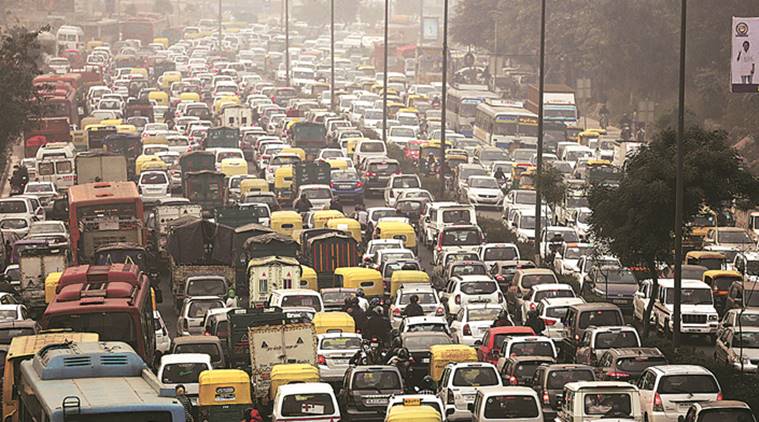Stay updated with the latest - Click here to follow us on Instagram
New policy favours e-vehicles, taxes ones run on petrol, diesel
Other highlights include the proposal to allow electric two-wheeler taxis to provide last-mile connectivity, cashback for passengers using e-autos of up to Rs 10 per trip.
 The city has been grappling with air pollution compounded by vehicular emissions. (Express Photo By Sandeep Daundkar/Representational)
The city has been grappling with air pollution compounded by vehicular emissions. (Express Photo By Sandeep Daundkar/Representational)
Users of diesel and petrol vehicles in Delhi will have to pay a “pollution cess” and enhanced road tax from April 2019, while Ola and Uber rides on vehicles using these fuels may also cost more with a “congestion fee” in the offing.
These measures are part of the AAP government’s Delhi Electric Vehicle Policy, 2018, a draft of which was released Tuesday. The government plans to create an Electric Vehicle Fund through these measures to incentivise electric mobility in the national capital.
The policy, which proposes subsidising all types of e-vehicles ranging from two-wheelers to autorickshaws, envisages that 25 per cent of all vehicle registrations should be those that are electrically-run by 2023. It has proposed that permits be launched for e-autos and a subsidy of up to Rs 22,000 be provided for purchase of electric two-wheelers. The e-vehicle corpus will comprise pollution cess, parking surcharge, road tax and congestion fee, it says.
“All petrol and diesel-powered vehicle users will pay a ‘Pollution Cess’ on the sale of fuel beginning from April 2019. A higher cess will be levied on diesel, and a known carnicogen, and the existing Diesel Cess will be subsumed under this,” the policy states. For road tax, the charges will be more in case of luxury petrol and diesel vehicles. “A congestion fee of 2.5 per cent on fare will be levied on all trips originating or terminating within the National Capital Territory of Delhi and taken through cab aggregator and ride-hailing services. This tax will be waived for rides taken in an e-two wheeler, e-auto or e-cab,” the policy states.
Other highlights include the proposal to allow electric two-wheeler taxis to provide last-mile connectivity, cashback for passengers using e-autos of up to Rs 10 per trip, support to encourage shift of e-rickshaws with lead acid batteries to those having advanced, swappable batteries.







